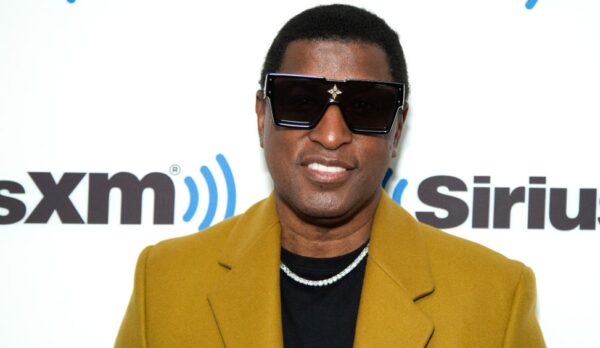Music mogul Kenneth “Babyface” Edmonds became one of the most revered singer-songwriters and producers in contemporary R&B history with songwriting hits such as “Don’t Be Cruel,” “Mercedes Boy” and “My, My, My.” However, early in his career, Edmonds was not so savvy in his business deals.

What Babyface Learned About the Music Biz
“Initially, back in those days, when you start out, you know, you gotta roll with what happens,” Babyface explained to “The Breakfast Club” on Oct. 24. “So, if the record company’s gonna take half and you wanna get a deal, then that’s what it is. And everybody went through [that] … We can all give you horror stories on publishing rights. But it’s gotten a lot better these days.”
Publishing music allows songwriters to receive royalties for their creative works. It also allows songwriters to be compensated when the song is performed and reproduced. When a songwriter signs a contract with a record label, it is their responsibility to negotiate for terms that will allow them to continue to generate income from their creativity.
According to the American Society of Composers, Authors, and Publishers (ASCAP), “under the traditional recording agreement, recording artist royalties usually range from 10% to 25% of the suggested retail price for top-line albums.”
Are artists making less money from traditional record companies today? “Simple math suggests that musicians are making less on recorded music sales because an increasing amount of royalty payments are based on sales of 99 cent singles, not $15 albums. Or, even worse, consumers aren’t paying anything at all,” according to a 2012 blog by Artist Revenue Streams, a project that examined how U.S.-based musicians’ revenue streams are changing and why.
Edmonds began his career in the 1970s performing with the group Manchild. In the 1980s, Edmonds made his mark as a songwriter for groups such as Atlantic Star while also serving as a member of the funk and R&B group The Deele. While it is unknown whether Edmonds is still reaping the benefits of songs such as “Slow Jam,” it is clear from his comments on The Breakfast Club that he did not get a record deal that would benefit him in the long run.
“Our publishing was just taken because we signed up to the record company. So, it was like they take it automatically,” Edmonds said. “You didn’t get any advance or anything.”
By 1989, Babyface left The Deele and launched LaFace Records with former group member Antonio “LA” Reid. Together, they produced artists such as Toni Braxton, Usher and TLC. His songwriting and production work on TLC’s second album, “CrazySexyCool,” helped it become the best-selling album in history by an American girl group.
To date, Edmonds has written and produced more than 26 No. 1 R&B songs and has won 12 Grammy Awards. His current net worth is $200 million.
Babyface Gives Detailed Insight into Music Business
During an interview with BLUFOX89, Babyface explained how the music business has developed and how artists can take advantage of the changes.
“Hip hop changed the game,” he noted in the Aug 29, 2022 episode titled “Babyface Breaks Down Publishing, Contract Advances, & Masters.” “They changed the game in the sense of that they started to figure out how to make money beyond the music. And so we have Puff and Jay-Z and to where they took what they were doing and took it outside of the music–brand deals. And Rihanna and Beyoncé, they started taking it places where R&B artists wouldn’t do–even the big pop artists weren’t doing the same.”
These new artists, said Babyface, “started saying like, ‘OK, I’m out to make some money; I’m gonna figure out how to make some money.’ And they became bigger than their music, and I thing there was the difference.”
He continued, “I think that there was a difference and a lot of younger artists today they don’t need the record companies as much. They don’t have to go to them for advances because they they may get all these kind of deals separate from [the record companies]. Because of the Internet, because of streaming and everything, they’re in a different position.”
He added the new artists are about “owning and changing the game and not just expecting what the labels were giving us and controlling what we can get; they came in and said, that’s not going to work for me.”
Babyface also went into why it is important for artists to control their publishing — and how artists are more in control.
In the past, the artist has less control. “Initially, back in the day you signed to a label and with certain labels, you had to give up your publishing just to get the opportunity. Or just at least 50 of it. Some labels, I won’t say names, they took 100. The game has changed today,” he said.
“If you can hold on to your publishing, that’s everything,” he shared, adding that today “deals have changed now where people don’t give away their publishing as much.”
He broke down the equation even further, saying when he first got signed he had to give away 50 percent of his publishing just to get the deal. “When you sign up to the label … they had 50 of the publishing, you still had some of your publishing but they had 50. So which basically comes down to you had 75 cents out of the dollar so they had 25 cents — and that was something you didn’t even get an advance for.”
Today, he said, labels will give you an advance on the publishing.
Babyface also stressed it is more important for artists to try to retain their publishing over their masters.
A master recording is the original recording of a song, sound, or performance.
“Publishing lives forever, the masters are just for that performance,” said Babyface.
Publishing Company, Support For New Artists
The music industry has evolved quite a bit since Edmonds first began performing in 1977. Today, artists have several income streams that will allow them to retain their wealth. While recording deals and publishing rights are still vital, Edmonds encourages artists to explore other avenues as well. According to Business Insider, artists traditionally are able to generate income from touring and merchandise associated with their act. However, in recent years, artists have been able to increase their wealth through television and film as well as partnerships with brands.
“It’s a whole different game at this particular point. And it’s not even all about the music. If you’re a star, then you can make money in so many other places, and it’s not really just about the music,” he said. “So, it’s a whole different game today.”
Edmonds is supporting rising artists through his publishing company Good Vibes Music Group. Launched with Jason Murray in 2018, the mission of the company is to provide musicians with transparency in their contracts so that they can remain creative while growing their net worth.
“I believe that all over the world there are incredible songwriters and producers that have never been discovered,” Edmonds said in a press release four years. “There has likely been many over the years that we’ve missed out on, that was even better than the top songwriters and producers we cherish today, we just weren’t able to see them – weren’t able to hear them. That’s what I’m most excited about. With the launch of our Good Vibes Discovery Song Camp and Good Vibes Music Group, we are giving those songwriters and producers a chance to be heard, to be mentored, and to realize their dreams.”




